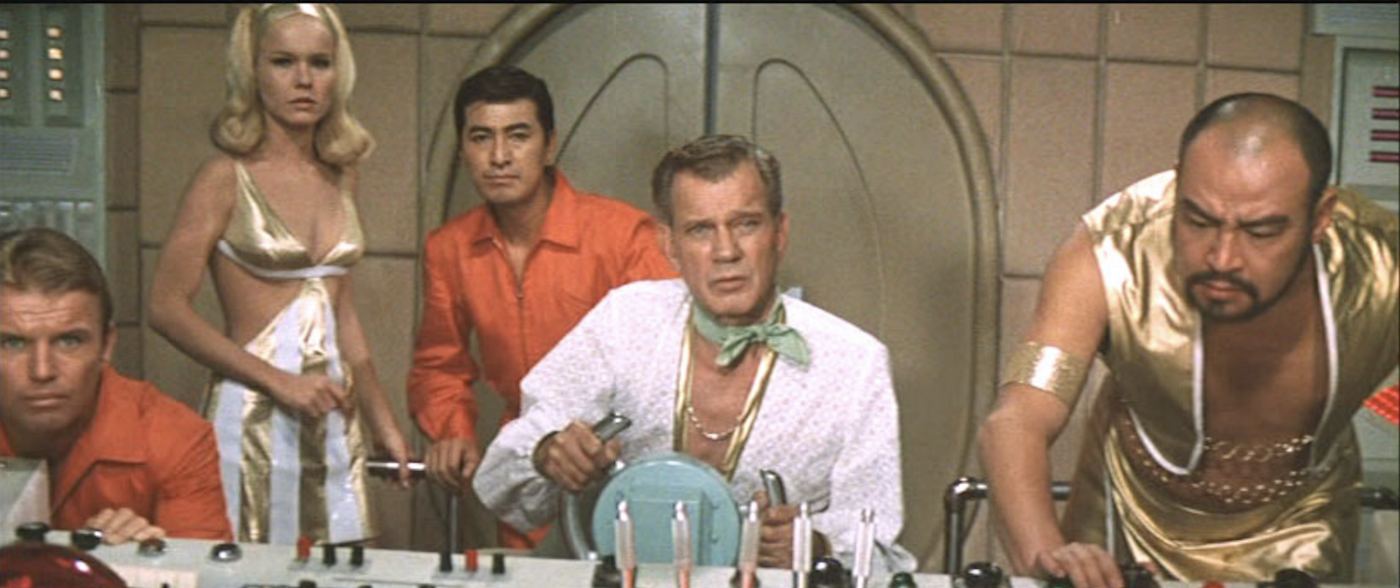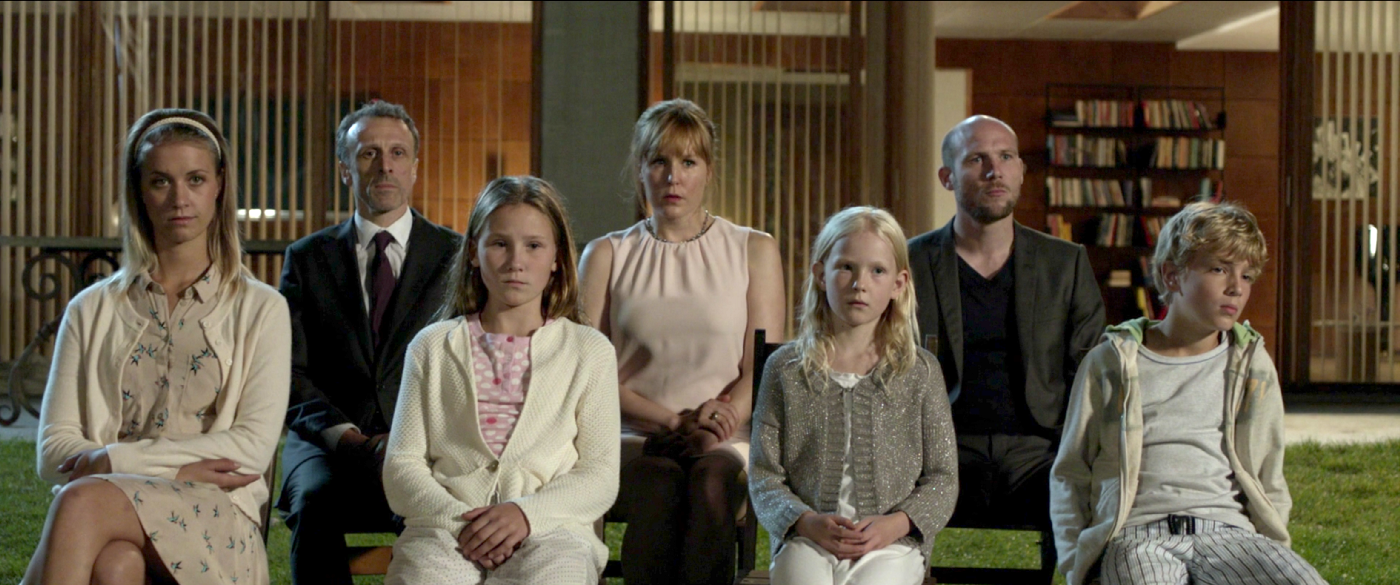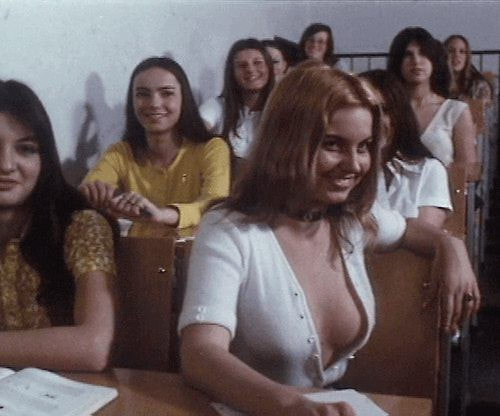
After you recover from the shock of the opening scene you realize you will need to recalibrate your surrealism scale if you are going to get through György Pálfi’s Taxidermia. This isn’t going to just be weird or dreamlike, watching this film is going to take some fortitude, otherwise, how would you account for an opening scene where a man in a grimy, little shack, masturbates until, with a triumphant yell, he shoots a plume of fire out his penis.
Taxidermia is both beautiful and nauseating. It’s a film of extremes that swings wildly in many directions. The camera reflects this in its movements. Suddenly the camera will start traveling in the most improbable, or even impossible directions. It passes through walls or under people, spinning in an impossible space. Its as though the screen we are watching is falling victim to the surrealism it is depicting.
There is a mind-bending scene where the floor of a room becomes something like a panel in a revolving door. It spins, and each time it flips over there is something new on the other side. We watch the changing sets and lose our orientation which turns the movie itself into a surreal object.

Pálfi made Taxidermia in 2006 in Hungary. I am sure that there is an entire layer of this film that I do not fully understand due to my limited knowledge of Hungarian history and politics. However, the film reaches much further than just a political allegory or parody. The primary engine of the film is the human body. Not just the shape of our physique but the blood, shit, vomit, semen, sweat, guts, and viscera of our existence. There’s sex and death and competitive eating.
The film centers around three men, each the son of the former. The first is Morosgovanyi, a libidinal, Caliban-like, perpetual masturbator. He’s the one whose penis shoots fire. He will hump anything, a hole in the wall, a pile of butchered pig parts, anywhere his member will fit. There are no cutaways or carefully cropped frames we see his penis plunge in and out of a hole in a shed until a rooster comes along and pecks it. A cock attacked by a cock.
When he is frantically humping the pig parts he fantasizes that it is an enormous corpulent woman screaming obscene instructions and encouragement. The editing flashes between the pig flesh, human flesh, butchery, fornication, masturbation, and close-ups of things that might be any of the above until you’re nauseous, confused, and ready to pass out.
Psychologist Harry Stack Sullivan once wrote about the boundaries we erect to differentiate between what he termed “the me” and the “not me.” Sullivan posed a simple experiment. Spit into a glass. Pause a moment, and then drink it back down. Many would recoil at the idea but Sullivan asks us to consider how arbitrary our reaction is. When the saliva is in your mouth it doesn’t bother you, but just a second later it is repulsive.

In Taxidermia, we are faced with all of our mortal productions. It’s up to us to gauge our reactions. I giant mass of innards is both a repulsive horror, but as it steams in the cold it is also fascinating and even beautiful.
The U.S. Military has a division that weaponizes horrible smells. In their research, they found that the key to a truly intolerable stink is that it must have pleasant and attractive elements. It’s as if it has to be a bait and switch. You need to be intrigued or aroused before the hammer comes down.
Surrealist Merit Oppenhiem’s Fur-lined Teacup from 1936 plays with this dynamic as well. It is discordant and uncomfortable but it is also sexy and evocative. Similarly, in Taxedermia, there is a scene where two people are huddled outside in the snow. We watch their interaction, but it isn’t until halfway through the scene that we notice that the snowflakes falling around them are little white feathers. The accumulation on the ground, on their coats, and in their hair isn’t the pure white crystals we thought they were, they are something corporal and dirty.

Morosgovanyi’s son is Kalman an enormous hulk of a man born with a pigtail that we watch Morosgovanyi cut off in close-up while the baby Kalman wails. Morosgovanyi’s world was that of the peasants. A farm filled with mud and shit. Morosgovanyi’s son inhabits a bourgeois world of Soviet-style progress. To emphasize the irony of Soviet culture Kalman is a competitive eater. A communist country obsessed with production and efficiency stages a grotesque display of conspicuous consumption. We are treated to several scenes of Kalman methodically gorging himself as well as expelling such copious amounts of vomit that even Monty Pythons Mr. Creosote would cringe. The competitions are conducted with Soviet Flags and dancing girls. It’s like some psychotic pageant. They eat giant gelatinous blocks of horse sausage or gallons of caviar out of a red trough-shaped like a Soviet star.

Kalman gets married and has a son, Balatony. When Balatony grows up he becomes a taxidermist. Just in case there is some bit of bloody, fatty, goo that Pálfi missed in the first two-thirds of the film, he manages to cover all his morbid bases in this last third. Even so, there is still a kind of poetic beauty in the madness. We watch Balatony prepare an orangutan for stuffing. It’s disgusting and brutal but also compelling. Instead of flashing us a shockingly gory moment and leaving us to imagine the rest, the camera watches intently as Balatony separates the skin from the fat and facia. It gives us time to get used to what we are seeing and examine it.
Balatony is a very creepy and completely miserable man. When he is not stuffing animal carcasses he must administer to his aging father’s needs. Kalman has grown so fat he can no longer move. The relationship between the two men and what transpires in the last third of the film is truly jarring and bizarre. Some things are better off left to the viewer to discover on their own, but the father being immobilized by excessive consumption, and the son being enslaved to an ungrateful beast who longs only for its past glory sets up abundant metaphors about capitalism, communism, and the masses of people caught in-between.

Taxidermia uses the human body as its arena. It is the vehicle for discussing our motivations, our excesses, our attempts at control, our relationship to society, and the state. In his book Discipline and Punish, Foucault tracks the changing relationship between the body and the state. A relationship that begins as corporal, where punishment is meted out physically on the body, but changes to something more insidious where the state targets our minds instead of our bodies.
Public hangings and floggings made obvious the power dynamic of the state and its ability to control behavior through force. Foucault compares this to the modern age and the rise of the surveillance state where the power dynamic between the individual and the state is hidden by an internalized coercion. By imagining the eyes of our neighbors and coworkers upon us, by raising the specter of Big Brother the blunt violence of the past is replaced with the more insidious hegemony of a state-sponsored super-ego that sounds like our own voice.
Taxidermia depicts this dynamic but reminds us that the mind can not be separated from the body. The brain is an organ like any other. No matter how abstract our thoughts may be we are still bound by our material existence. Our body is what anchors us to reality like a boat with its anchor down and its engines spinning. We aspire to become many things but we are always still flesh and blood and vomit, and semen, and sweat, and urine, and tears, and all the other things we produce and either accept or reject.

Marx focused on humans as producers of objects. He wrote about factories and the means of production but our bodies are already in a constant state of production and consumption. All life must destroy life in order to maintain itself and through that destruction turn the life consumed into waste. Life eats life and shits out waste which is then eaten by other life.
To make life more palatable we try not to think in these terms. We essentially hide the truth away and sniff fine wine seeking out the notes of oak or pear instead of slurping down the rotten juice of dead grapes in order to feel the queasy joy brought on by having ingested poison. So too the state prefers its own illusions of humanity and egalitarian justice and masks its poison in rarefied ideals.

If you enjoyed this article click here for more
www.filmofileshideout.com/archives/gyorgy-palfis-hukkle



